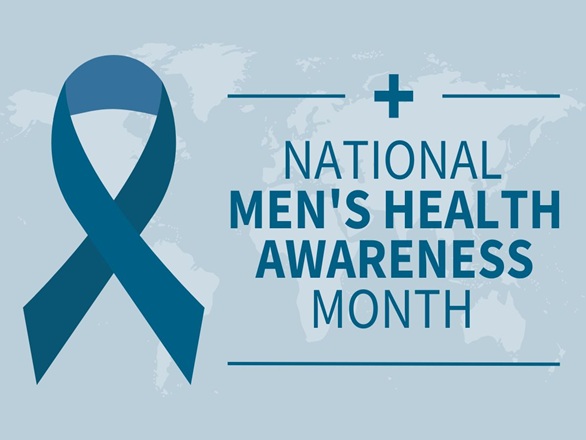In this edition
- Men’s Health Month Eat Well, Move More, Live Longer!
- National Internet Safety Month
About the Newsletter
With summer right around the corner, come read our newsletter about overall health and making healthy habits. The article is geared towards men for men's health month, but it's general information that could apply towards everyone for the most part. You can also learn about internet safety and how to avoid scams.
Men’s Health Month: Eat Well, Move
More, Live Longer!
By: Hans Weding, R.D.
June is Men’s Health Month, a time to focus on staying strong and healthy. A balanced diet and regular exercise are two of the best ways to prevent disease and boost energy. Small changes today can lead to a longer, healthier life!
Fuel Your Body with the Right Foods - Eating the right foods helps maintain a healthy weight, supports heart health and reduces the risk of diseases like diabetes and high blood pressure.
Load Up on Nutrient-Rich Foods:
- Lean Proteins (chicken, fish, beans) build muscle and keep you full.
- Whole Grains (brown rice, quinoa, whole wheat bread) provide lasting energy.
- Fruits & Vegetables give you essential vitamins and minerals.
- Healthy Fats (avocados, nuts, olive oil) support heart and brain health.
Limit These Foods:
- Processed & Fast Foods – High in unhealthy fats and sodium.
- Sugary Drinks & Snacks – Can lead to weight gain and diabetes.
- Excess Alcohol – Increases the risk of heart disease and liver damage.
Drink More Water! Aim for 8+ glasses a day to stay hydrated and keep your body functioning.

Get Moving: Exercise for a Stronger Body- Physical activity keeps your heart healthy, boosts mood and strengthens muscles.
How Much Exercise Do Men Need?
- 150 minutes of moderate exercise per week (brisk walking, biking) or
- 75 minutes of intense exercise per week (running, swimming)
- Strength Training (lifting weights, bodyweight exercises) two times per week to build muscle and prevent injury.
Easy Ways to Stay Active:
- Take the stairs instead of the elevator.
- Walk or bike instead of driving short distances.
- Stretch and move during work breaks.
- Join a local sports league or gym.
Key Health Concerns for Men
- Heart Disease – The #1 cause of death in men. High blood pressure, high cholesterol and smoking increase the risk. Exercise, a balanced diet and regular checkups help.
- Prostate Health – Prostate cancer is the second most common cancer in men. Talk to your doctor about screening if you're 50+ (or 40+ with a family history).
- Mental Health – Depression and stress often go unnoticed. Don’t ignore feelings of sadness or anxiety—reach out for help.
- Diabetes – Many men have diabetes but don’t know it. Symptoms include fatigue, frequent urination and extreme thirst. A simple blood test can check for diabetes.
Healthy Habits for a Stronger You
- Get Regular Checkups – Even if you feel fine, screenings can catch problems early.
- Stay Active – Aim for 30 minutes of exercise most days of the week.
- Eat Right – Cut back on processed foods and sugar. Eat more fruits, vegetables and lean protein.
- Manage Stress – Try deep breathing, hobbies or talking to a friend.
- Limit Alcohol & Quit Smoking – Both increase health risks. Seek support if needed.
Take Action This June!- Make Men’s Health Month a time to start healthy habits. Encourage friends, family and coworkers to do the same!
June is National Internet Safety Month!
Article By James Quiazon, Extension Southern Area, Information Technology Technician II

Scammers send fake text messages to trick you into giving them your personal information — things like your password, account number or Social Security number. If they get that information, they could gain access to your email, bank or other accounts. Or they could sell your information to other scammers.
Scammers often try to get you to click on links in text messages by promising you something. Scammers might:
- promise free prizes, gift cards or coupons, but they’re not real
- offer you a low or no interest credit card, but there’s no deal and probably no card
- promise to help you pay off your student loans, but they won’t
Scammers also send fake messages that say they have information about your account or a transaction. Scammers might:
- say they’ve noticed some suspicious activity on your account, but they haven’t
- claim there’s a problem with your payment information, but there isn’t
- send you a fake invoice and tell you to contact them if you didn’t authorize the purchase, but it’s a scam
- send you a package delivery notification, but it’s fake
The messages might ask you to give some personal information, like how much money you make, how much you owe or your bank account, credit card, or Social Security number, to claim your gift or pursue the offer. Or they might tell you to click on a link to learn more about the issue. Some links might take you to a spoofed website that looks real but isn’t. If you log in, the scammers might then steal your username and password.
Other messages might install harmful malware on your phone or computer, stealing your personal or financial information without you realizing it.
What to Do About Spam Text Messages- If you get a text message you weren’t expecting and it asks you to give some personal or financial information, don’t click on any links. Legitimate companies won't ask for information about your account by text. If you think the message might be real, contact the company using a phone number or website you know is real - NOT the information in the text message.
AARP Fraud Resource Center
Published by:
Weding, H., 2025, Healthy LIVING while aging! (2025-06), Extension, University of Nevada, Reno, Newsletter
An EEO/AA Institution. Copyright ©
2026, University of Nevada Cooperative Extension.
A partnership of Nevada counties; University of Nevada, Reno; and the U.S. Department of Agriculture


